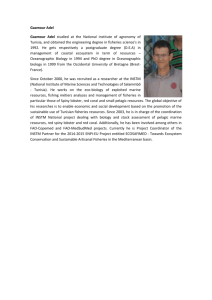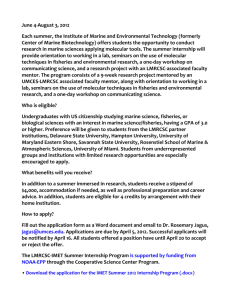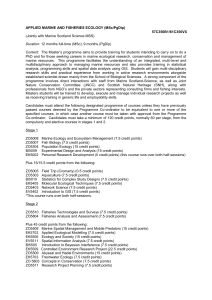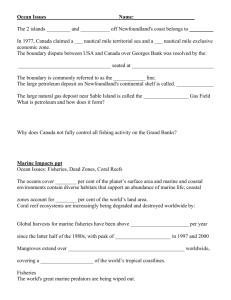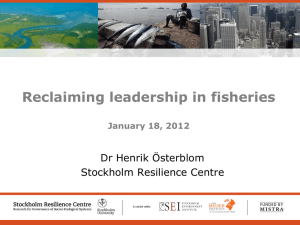A FUTURE FOR FISHERIES? SYMPOSIUM Towards effective strategies for sustainability
advertisement
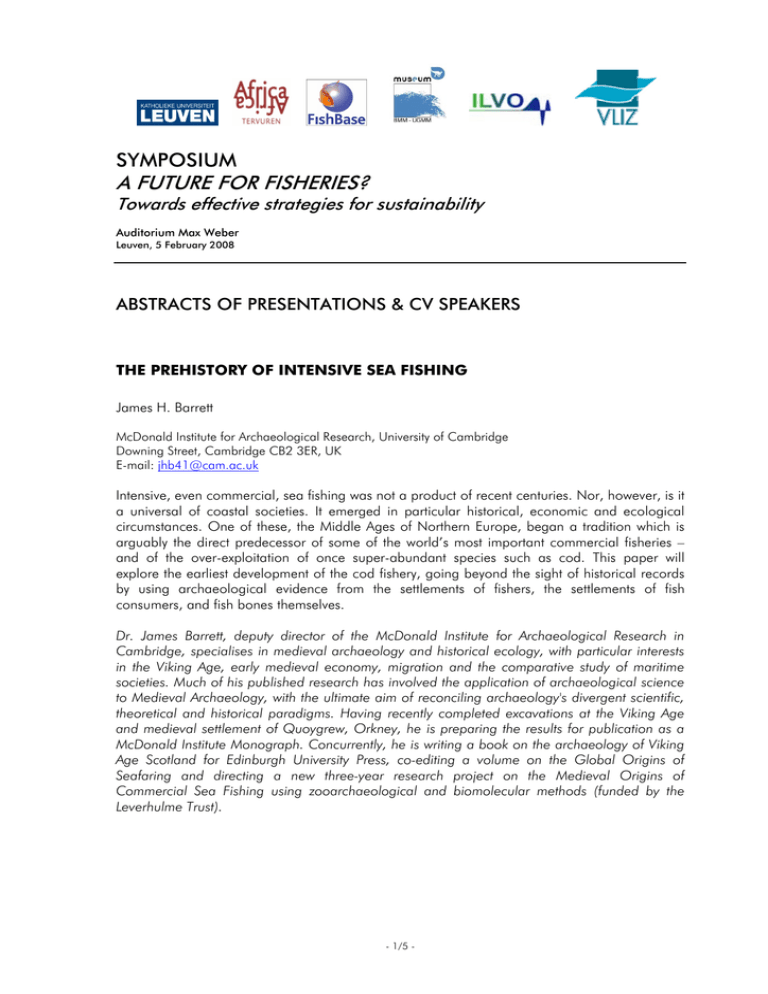
SYMPOSIUM A FUTURE FOR FISHERIES? Towards effective strategies for sustainability Auditorium Max Weber Leuven, 5 February 2008 ABSTRACTS OF PRESENTATIONS & CV SPEAKERS THE PREHISTORY OF INTENSIVE SEA FISHING James H. Barrett McDonald Institute for Archaeological Research, University of Cambridge Downing Street, Cambridge CB2 3ER, UK E-mail: jhb41@cam.ac.uk Intensive, even commercial, sea fishing was not a product of recent centuries. Nor, however, is it a universal of coastal societies. It emerged in particular historical, economic and ecological circumstances. One of these, the Middle Ages of Northern Europe, began a tradition which is arguably the direct predecessor of some of the world’s most important commercial fisheries – and of the over-exploitation of once super-abundant species such as cod. This paper will explore the earliest development of the cod fishery, going beyond the sight of historical records by using archaeological evidence from the settlements of fishers, the settlements of fish consumers, and fish bones themselves. Dr. James Barrett, deputy director of the McDonald Institute for Archaeological Research in Cambridge, specialises in medieval archaeology and historical ecology, with particular interests in the Viking Age, early medieval economy, migration and the comparative study of maritime societies. Much of his published research has involved the application of archaeological science to Medieval Archaeology, with the ultimate aim of reconciling archaeology's divergent scientific, theoretical and historical paradigms. Having recently completed excavations at the Viking Age and medieval settlement of Quoygrew, Orkney, he is preparing the results for publication as a McDonald Institute Monograph. Concurrently, he is writing a book on the archaeology of Viking Age Scotland for Edinburgh University Press, co-editing a volume on the Global Origins of Seafaring and directing a new three-year research project on the Medieval Origins of Commercial Sea Fishing using zooarchaeological and biomolecular methods (funded by the Leverhulme Trust). - 1/5 - MODELING AND MEASURING THE PROCESS OF WATERSHED CHANGE, AND IMPLICATIONS FOR FISHERIES Karin E. Limburg College of Environmental Science, State University of New York Syracuse, NY 13210, USA E-mail: KLimburg@esf.edu The paradigms that support economic activity vs. watershed science are radically different, yet economic activity has major impacts on watersheds and their connected estuaries and coastal oceans, so linking the paradigms is needed for understanding and management. In the Hudson River estuary in New York State, USA, we have been studying how economy can drive land use change, and how this in turn can affect ecosystem health. Here I present an overview of the project, and include an integrated model of these processes. I then discuss the implications of ‘business as usual’ watershed activities on fisheries, and propose a set of directions for sustainable watershed/coastal zone management. Karin Limburg is an Associate Professor of Fisheries and Ecosystem Science at the College of Environmental Science and Forestry in Syracuse, NY. She received her MSc in Systems Ecology under Howard Odum at the University of Florida and her doctorate under Simon Levin at Cornell University. Her interests range from fisheries ecology (especially of diadromous fishes) to ecological economics. Watershed science has served as a vehicle to link fisheries and ecological economics. She served as President of the US Society for Ecological Economics (2006-07) and is currently Past-President. THE OVERLOOKED EVOLUTIONARY DIMENSION OF MODERN FISHERIES Ulf Dieckmann Evolution and Ecology Program, International Institute for Applied Systems Analysis A-2361 Laxenburg , Austria E-mail: dieckmann@iiasa.ac.at World fisheries have reached their limit, with three stocks out of four being maximally exploited or overexploited. This does not only change the abundance of exploited fish but also their traits and genetic composition, adding an evolutionary dimension to fisheries. Evolutionary changes in fish stocks must be of concern to managers, since they are bound to affect sustainable yield as well as the stability and recovery of stocks. Once this blind spot in perceiving the consequences of human exploitation is overcome, a new generation of fisheries scientists and managers will need scientific tools to cope with the threats of undesired fisheries-induced evolution. Ulf Dieckmann is Program Leader of the Evolution and Ecology Program at the International Institute for Applied Systems Analysis in Laxenburg/Vienna, Austria. He is working on fisheriesinduced evolution, the theory of adaptive dynamics, speciation theory, spatial ecology, lifehistory theory, and on problems in theoretical evolutionary ecology. Dr. Dieckmann received his bachelor's degree in physics and his master's degree in theoretical physics from the University of Aachen, Germany. He completed his Ph.D. research on theoretical biology at Leiden University, the Netherlands, and obtained his Habilitation (venia legendi) in biomathematics from the - 2/5 - University of Vienna. He has worked at Stanford University and the Xerox Palo Alto Research Center, California, USA, the Research Center Jülich, Germany, the University of York, UK, Leiden University, the Netherlands, and the University of Vienna, Austria. He has been a visiting professor at the University of Montpellier, France, and a research fellow at the Institute for Advanced Study, Wissenschaftskolleg zu Berlin, Germany. INTEGRATED MANAGEMENT OF MARINE ECOSYSTEMS AND THE ROLE OF MARINE PROTECTED AREAS Han Lindeboom Wageningen IMARES-Texel Den Burg, Texel, the Netherlands E-mail: han.lindeboom@wur.nl The human pressure upon our seas is increasing. Apart from traditional uses such as fisheries, oil and gas exploration, and transport, new activities such as wind parks and sand extraction are expanding. At the same time the first signals of climate change are becoming clear and there is a growing demand for sustainable use and protection of the complex marine ecosystem. But the high beam trawl intensity has already changed a diverse area into a ploughed habitat where nature values are deteriorating. And the growing demand for sustainable energy sources may lead to the construction of huge wind parks competing for space with fisheries, transport and nature. This calls for an integrated management of the marine realm. In this lecture the effects and conflicts of different uses, possible solutions for sustainable development and the role of Marine Protected Areas will be discussed. Dr Han Lindeboom, member of the Board of Directors of IMARES responsible for science, is a marine ecologist with a strong interest in the application of science for a sustainable management of the marine realm. Key study area is the natural and human induced variability of the marine ecosystem and the integrated impact of manageable and non-manageable drivers upon marine species and habitats. Here the emphasis lays upon the effects of climate change and the possibility of regime shifts. He guides and executes research programmes to collect supporting scientific knowledge in the Wadden Sea, North Sea and Polar Regions. Spatial planning of the North Sea, with the emphasis on the creation of Marine Protected Areas, development of offshore wind parks and the development of sustainable non-destructive fishing practices, has his special interest. LEGAL PERSPECTIVES IN COASTAL ZONE MANAGEMENT Frank Maes Public International Law , University of Ghent Universiteitsstraat 4, B-9000 Gent, Belgium E-mail: frank.maes@ugent.be For too long people have considered the sea as an endless space in which there is plenty of room for sea bound activities and activities banned on land. Past activities were mainly planned on an ad hoc basis, looking for spots that did not interfere with already existing activities at sea and ignoring the ecological important land-sea interactions, the ecosystems and the - 3/5 - implementation of sustainable management of seas. This lecture will focus on developments in the EU concerning integrated coastal management, the marine strategy and marine spatial planning in the North Sea within the context of the law of the sea. Dr. Frank Maes is full-time professor of Public International Law in the Faculty of Law at Ghent University since 1998. He is research director of the Maritime Institute at Ghent University (www.maritieminstituut.be). His mean field of research is international environmental law, shipping and climate change, law of the sea, freshwater law, environmental governance and compliance. He was coordinator of interdisciplinary marine research projects focusing on marine spatial planning and sustainable management of the Belgian part of the North Sea. He is author of several publications in books and journals, research reports and co-author of water legislation (e.g. Belgian law on the protection of the marine environment (1999); Flemish decree on integral water policy: implementing the EU Framework Directive Water (2003)). He is Belgian Bencore ambassador for marine spatial planning and Belgian ambassador for the EU Maritime Policy. IMPACT OF FISHERIES AND GLOBAL WARMING ON MARINE ECOSYSTEMS AND FOOD SECURITY Daniel Pauly Fisheries Centre, Aquatic Ecosystems Research Laboratory (AERL) 2202 Main Mall, The University of British Columbia, Vancouver, BC, Canada V6T 1Z4 E-mail: office@fisheries.ubc.ca Individual fisheries are generally perceived as one fleet exploiting one or several target species. The vision of fisheries that will be presented here, however, is that of a global, integrated system spanning the oceans. Consumers in the European Union, the United States, Japan and increasingly China, have been to date largely unaffected by the local depletions these fleets induce, as they are buffered by seafood imports from the developing world. Global fisheries, fed by onerous subsidies, have an enormous impact on marine ecosystems, with the biomass of large target species generally reduced by a factor of ten a few decades after a fishery opens. This form of interaction with marine organisms, intensified by the effects of global warming, will lead in the next decades to a succession of local extirpation, followed by global extinctions. Confronting this will require a new mode of thinking on how humans and marine wildlife can co-exist on Earth. Dr. Pauly became a Professor at UBC's Fisheries Centre in 1994, after many years at the International Centre for Living Aquatic Resource Management (ICLARM), then in Manila, Philippines. His scientific output, mainly dedicated to the management of fisheries, and to ecosystem modeling, comprises numerous contributions to peer-reviewed journals, authored and edited books, reports and popular articles (see below), and the concepts, methods and software he (co-) developed are in use throughout the world. This applies notably to the ecosystem modeling approach incorporated in the Ecopath software (see www.ecopath.org), to FishBase, the online encyclopedia of fishes (see www.fishbase.org), and the global mapping of fisheries trends (see www.seaaroundus.org). - 4/5 - OTHER PANEL MEMBERS Charles Clover Environment editor, The Daily Telegraph London, UK E-mail: Charles.Clover@telegraph.co.uk Author and Environment Editor of The Daily Telegraph. With The Prince of Wales, he was author of Highgrove (Chapman’s, 1997). Charles Clover's multi-award winning book ‘The End of the Line’, on the dire ecological, industrial and consumer effects of over-fishing the world's oceans, was sold to Ebury Press, Random House UK. ‘The End of the Line’ was awarded a special commendation at 2005's highly prestigious André Simon Memorial Fund Book Awards. Emiel Brouckaert Rederscentrale cv Hendrik Baelskaai 25, B-8400 0ostende, Belgium E-mail: rederscentrale@online.be Director of the Belgian Fisheries Union Camiel Derichs Marine Stewardship Council, the Netherlands E-mail: camiel.derichs@msc.org North European Commercial Manager, leading MSC's commercial and fisheries outreach activities in The Netherlands. - 5/5 -

